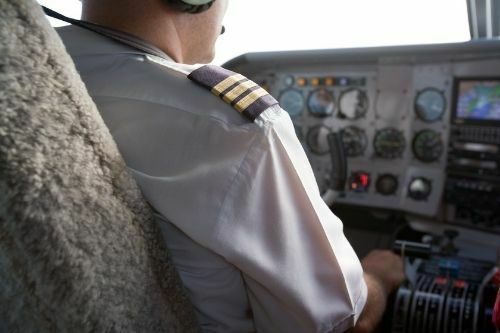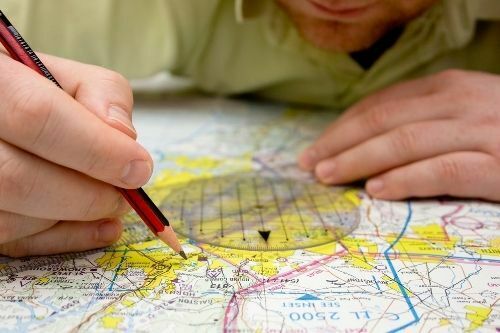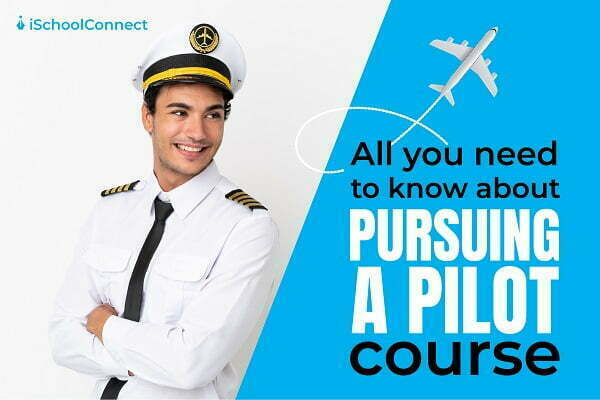Table of Contents
As per the statistics published by the United States Bureau of Labor Statistics, the job opportunities for pilots are growing at a rate of 13%. Between 2020 and 2030, an estimated 113,900 airline and commercial pilot opportunities are available in the market.
Pilots work for specific companies and help transport people and cargo strictly according to fixed schedules. As a professional pilot, your responsibilities will typically include the navigation of aircraft, helicopters, and airplanes.
If you are considering an aviation career, understanding every aspect of a pilot course can help you develop the relevant skills. So, keep reading to learn everything you need to know about pilot training courses!
What are the skills learned in a pilot course?
An undergraduate pilot course will consist of extensive training. The rigorous learning will help you develop all relevant skills needed for a career as a pilot. As a part of the curriculum, you will have to undergo a range of practice tests.
Some of the essential skills covered in a pilot course include-
1. Clear communication skills
While clear communication is crucial for any job, it is significant for pilots. Without accurate pilot-controller communication, there is an increased risk of flight accidents.
With a pilot course, you will learn to communicate the following-
- Where – Explaining the position you are in with latitude and longitude.
- What & How – Sharing information on airspeed, direction – heading left or right, and altitude (climbing, descending, or maintaining).
- When – Accurate information on flight timings – immediately, expected, or anticipated.
- Purpose – Sharing information on the purpose of your flight – clearance, instructions, proposals or conditions statements, requests, and confirmation.
2. Situational awareness

A key skill that you will develop in a typical pilot course is situational awareness. As a pilot, you will need to create clear mental pictures of the aircraft’s location, flight conditions, and energy & configuration.
This trait can significantly help control the following circumstances that can happen with air travel-
- Loss of separation
- Encounter with adverse weather
- Airspace infringement
- Loss of control
- Controlled Flight into Terrain (CFIT)
3. Spatial orientation
As a part of the pilot course, you will learn to share information on aircraft altitude and geographical position accurately. These details will be crucial and have to be communicated at every stage of the aircraft journey.
For spatial orientation, the course will help you learn how to perceive, integrate, and interpret proprioceptive (receptors behind the skin, muscles, joints, and tendons) and vestibular (organs located in the inner ear) sensory information.
4. Mode awareness
The skills you will learn for mode awareness include-
- Flight-planning functions, data-input, and state of Flight Management System (FMS).
- Hold/Acquire/Armed Modes
- Heading
- Speed
- Altitude Status
5. Adaptability
As a pilot, you will need to display a combination of problem-solving, time-management, and multi-tasking skills. A regular pilot course will help you work with all of the listed skills, ensuring you succeed in your professional responsibilities.
What are the subjects covered in a pilot course curriculum?

Pilot training is a highly professional and skilled course. The course syllabus includes several vocational subjects, such as-
Year 1: The first year covers the basics of flying, which include the following topics –
- Approach & Landing
- Normal & Cross-Wind Take-Off
- Stability & Control
- Airframe
- Power-Off Stalls
- Eight-on Pylons
Year 2: The second year places emphasis on critical components of a career as a pilot, such as-
- VOR Navigation
- Flight Physiology
- Fundamentals of Data Science
- Aeromedical Factors
- Flight Training Process
- Aviation Meteorology
Year 3: The third year completes the course training with practical applications of theoretical concepts. Topics in this year include-
- Radio Navigation
- Air Law
- Human Performance & Limitations
- Principles of Flight
- Operational Procedures
Which universities abroad offer a pilot course?
If you are considering pursuing a pilot course abroad, the top universities that offer distinguished training include-
- University of East London, United Kingdom
- University of New South Wales, Australia
- Massey University, New Zealand
- University of the Fraser Valley, Canada
- Coventry University, United Kingdom
- Mount Royal University, Canada
- University of West London, United Kingdom
- University of Leeds, United Kingdom
- Florida Institute of Technology, United States
- University of South Australia, Australia
- University College-Birmingham, United Kingdom
What are the career opportunities I can consider after a pilot course?
Once you have completed your training in an undergraduate pilot course, there are several lucrative career opportunities that you can consider, including-
- Experimental Test Pilot
These professionals test newly-developed planes that have not been flown before. The three phases they work in are – Plan, Fly, and Report.
- Commuter Pilot
Commuting pilots primarily work on a contractual basis. They typically live away from their home country and fly from a designated base for their airline.
- Commercial Pilot
Commercial pilots work for different airlines, private companies, and private individuals. For this specific profile, you will need to have a license and a minimum number of hours of flying experience.
- Co-Pilot
Co-pilots assist professionals with their delegated flight duties. Freshers often get the opportunity to work as co-pilots and help decide the route and speed during take-off and landing. In specific cases, co-pilots take charge of the flight where the pilot fails to resume their responsibilities.
The benefit of being a co-pilot is that you can explore the different kinds of career opportunities available before choosing a vocation aligned with your interests.
Key Takeaways
- A career as a pilot is a dynamic and lucrative option to consider for aspirants with the relevant skills and qualifications.
- The job prospects for pilots are steadily increasing, providing a plethora of opportunities for qualified professionals to consider.
- Pursuing a pilot course from a recognized university is the best way to gain the relevant skills needed for a career as a pilot.
- Pilot courses cover a range of different subjects in the curriculum, giving students comprehensive theoretical & practical training.
- After completing a pilot course, you can explore several career options as per your goals and interests.
That’s all we have for you in this blog! If you need assistance with choosing the right university for pursuing the course, reach out to us or drop a comment below!
Liked this blog? Read next: Medical courses after 12th | Top 7 courses you must think about
FAQs
Q1. What do flight instructors do?
Answer – Flight instructors train student pilots in on-ground training & flying. Senior pilots often also work as flight instructors.
Q2. How long does it take to procure a pilot’s license?
Answer – After the completion of your selected course (which is an approximate duration of 3 years), you will need a minimum of 1 year to complete and clear the examinations for a pilot’s license. The final duration varies depending on how well-prepared you are.
Q3. What are the different kinds of pilot licenses available?
Answer – The different kinds of pilot licenses available include – Student Pilot License (SPL), Private Pilot License (PPL), and Commercial Pilot License (CPL).






